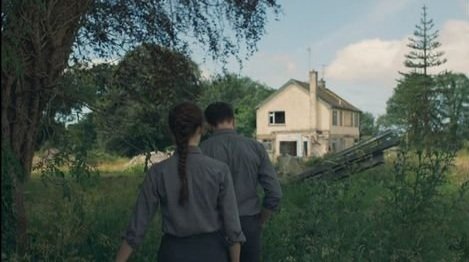Life Goes On, and Yet, It Doesn’t: Reflections on ‘Normal People’
By Natalie McCarty
“Yeah, you know me.”
“I did once.”
It took me three years to finish Normal People. Three years of knowing the ending loomed just within reach, and yet I couldn't bring myself to see it through. Not because it wasn’t captivating or deeply moving—on the contrary, Normal People felt too real, too intimate.
It’s fitting that writing this piece has also taken time (eight months). So, let’s get to it: Normal People is the love story of our generation. Raw, devastating, and tender, it defies the expectations of modern romance on-screen. Adapted from Sally Rooney’s novel, this 12-episode series explores love in its truest form: obsessive, transformative, and, often, fleeting.
It isn’t a glossy, neatly packaged love story designed to make you feel good, but it sure will make you feel seen. At its heart, the series tells the story of Marianne (played by Daisy Edgar-Jones) and Connell (Paul Mescal), two people bound by a deep, complicated love yet perpetually unable to make it work.
Edgar-Jones and Mescal deliver performances of a lifetime, their magnetic chemistry exploring this idea that love is simultaneously the thing that saves us and destroys us. Their relationship is uncomfortably real, and therein lies its power.
They know each other’s deepest insecurities and wildest dreams, and in that knowledge, there’s both healing and destruction.
The lines they cross and recross are thin and frayed, the kind of boundaries that should never be breached, but somehow, they do. And even when they are apart, they remain tethered to each other. Their connection suffocates as much as it sustains—a paradox where love becomes pain.
And maybe that’s the brilliance of Normal People. It's a raw portrayal of love that feels so close to your bones, so unnervingly familiar, that you're scared to find the ending. Perhaps that’s why I avoided Connell and Marianne for so long—because watching their story forces us to confront the excruciating truth about love: sometimes, it’s not enough.
Experiencing the seasons of life alongside Connell and Marianne feels as if you're living their relationship yourself. There aren’t enough—or perhaps the right—words to truly capture the feelings it evokes. It’s a visceral sensation, like the show is unearthing memories buried in your own mind, weaving their story into the fabric of your past. The camera work and cinematography don’t just tell their tale; they immerse you in it, creating a near three-dimensional embodiment of your own recollections. You find yourself shuffling between perspectives, trading places with the characters, and seeing your emotions mirrored back at you.
I had hoped the conclusion would offer me hope, resolution, or understanding of my own situation. In reality, Normal People did none of those things. Instead, it chewed me up, spit me out, and left me without true resolution.
Love, in all its intensity and complexity, is not a normal thing. It's not normal to sacrifice your life for someone else—to put aside your passions, pursuits, beliefs, and even your very self just to love another person. And yet, when you find a love that raw, that pure, that untapped, how do you walk away?
How do you walk away from something that feels like what everyone—lovers, writers, poets, all of them—search for their entire lives? That rare connection where someone knows you not just for who you are, but for who you will become. When someone understands you before you've spoken, when they heal wounds you never thought would close, how do you abandon that?
Even when that love strips you of your individuality and molds you into an extension of what once was, it feels impossible to let go. How do you abandon someone who knows you so intimately, whose absence feels like losing a part of yourself?
That’s the thing about Normal People—it’s not just about love, it’s about the aftermath of love. The silent spaces between conversations, the lingering memories, the life that keeps moving forward even when you don’t.
Love, the show tells us, is full of grief, torture, acknowledgment, and sacrifice. There’s something hauntingly accurate in its depiction—how it's never really right with the person who could love you the most. There’s always something unresolved, some piece of yourself you give up, and some part of the relationship that remains incomplete.
It’s about those moments of complete truth in relationships like where Marianne whispers, “I just can’t get people to love me,” or Connell’s quiet devastation in realizing, “I can’t get that life back.” It knocks the wind out of you. The dialogue in this show just brings back echoes of what was, in the “what-ifs” and the “what-could’ve-beens,” tethered to something you can’t fully let go of but also can’t fully keep.
The truth is, life goes on, and yet, it doesn’t.
The past, no matter how much we long for it, is gone. It’s unreachable. And the relationships we had, the people we loved, the versions of ourselves that existed then—they're out of reach too. We can’t get them back. All we have left is the fragments of memories and the quiet hope that we’ll be able to carry those pieces of ourselves into the future.










